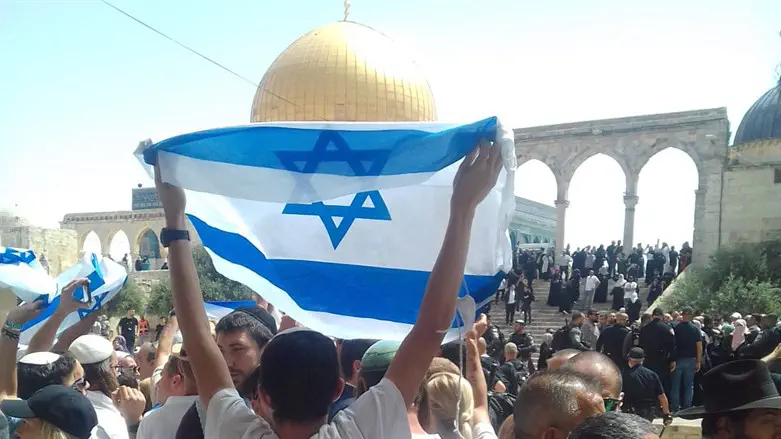
In two weeks' time, the Jewish People will mark Tisha b'Av, the ninth day of the Jewish month of Av, upon which the Holy Temple was destroyed by the Babylonians almost 2,500 years ago; four hundred years later the rebuilt Temple was destroyed on the same date by the Romans. Aside from Yom Kippur, this is the strictest fast day in the Jewish calendar.
According to the Beyadeinu organization, thousands of Jews plan to visit the Temple Mount site on this day, and therefore they have authored a report to be presented to the authorities, warning that appropriate preparations should be made in advance, in order to avoid another tragedy on the scale of the Meron disaster just over a year ago, when 45 people lost their lives due to the failure of the authorities to manage the crowds gathered.
"Government ministries -- with an emphasis on the Prime Minister's Office, the Religious Services Ministry, the Public Security Ministry, and the Transportation Ministry -- bear the responsibility for providing solutions for those Jews who ascend to the Temple Mount, and for making advance preparations for the principle days when people visit the Mount when thousands of Jews are expected to do so," Beyadeinu writes, as reported by Israel Hayom.
The report also urges the authorities to appoint ushers to direct visitors, hand out water to drink, and ensure that shaded areas are set aside on the Mount itself.
In fact, Beyadeinu goes further and states that construction work to broaden the access bridge to the Mount is necessary in order to avoid bottlenecks and to permit an unimpeded flow of visitors rather than letting only small groups of people access the bridge at intervals, as has been the case in the past.
"The site has been neglected for years," Beyadeinu director Tom Nissani, the author of the report, stated, "because no one cares. In years past, when around ten people visited the Mount per day, or even just one Yehuda Glick, no one needed to pay any attention. What the government doesn't seem to have realized is that things have changed and that on every religious or national occasion, thousands of people go up to the Mount.
"What we saw on Yom Yerushalayim was simply awful," he added. "Hundreds of people were forced to stand in the sun, and there were no ushers or anyone of any kind supervising what went on. It could have ended up with small children crushed as they waited on line, G-d forbid, or with adults collapsing from dehydration. On Tisha b'Av the danger is compounded -- we'll be dealing not just with overcrowding but also with the possibly dehydration of all the adults who will be fasting. Therefore, we have appealed to the Prime Minister, the Religious Affairs Minister, the Minister for Public Security, and the various relevant Knesset committees, and I hope that something will be done and that it won't take a tragic loss of life for them to wake up after the event, as is usually the case in this country."
On Yom Yerushalayim, Jerusalem Day earlier this year, around four thousand people arrived outside the Temple Mount site, hoping to be permitted to visit. This was a record number of visitors, and included the elderly, women, and young children. They were forced to stand for long hours in the sun, in a small and crowded area, with no water supplied. As they progressed slowly toward the entrance, they were confined to a narrow path as they approached the security check at the bridge that leads up the Mount.
In response to Nissani's report, the Religious Affairs Ministry issued a statement saying, "The entire area concerned falls within the area of responsibility of the Prime Minister's Office." Nissani then approached the Prime Minister's Office, which referred him to the Public Security Ministry, which referred him to Israel Police, which issued a statement saying:
"Visits to the Temple Mount are made possible in accordance with the regulations defined by the government authorities. Police physically protect visitors who are able to visit the site in a safe manner. On Yom Yerushalayim there was no dangerous overcrowding, and we are making preparations in advance of Tisha b'Av."
